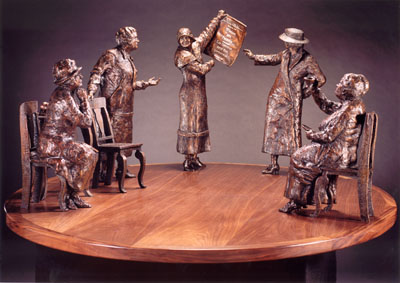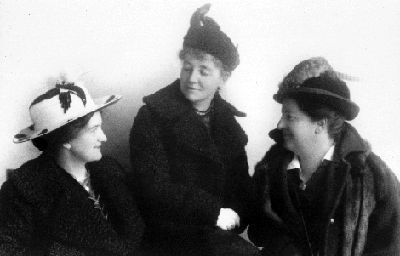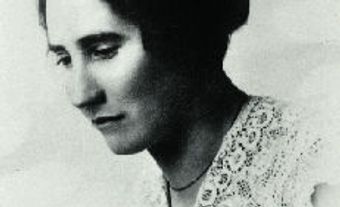Early Life and Career
Nellie McClung was raised on a homestead in the Souris Valley, Manitoba, from 1880 and did not attend school until she was 10. She received a teaching certificate at 16 and then taught school until she married Robert Wesley McClung in 1896. In Manitou, Manitoba, where her husband was a druggist, she became prominent in the Woman's Christian Temperance Union, of which her mother-in-law was provincial president. In 1908 McClung published her first novel, Sowing Seeds in Danny, a witty portrayal of a small western town. It was a national best-seller and was followed by numerous short stories and articles in Canadian and American magazines.
Activism and Politics
In 1911, the McClungs and their four children moved to Winnipeg, where their fifth child was born. The Winnipeg women's rights and reform movement welcomed Nellie as an effective speaker who won audiences with humorous arguments. She played a leading role in the 1914 Liberal campaign against Sir Rodmond Roblin's Conservative government, which had refused women suffrage, but moved to Edmonton before the Liberals won in Manitoba in 1915.
In Alberta McClung continued the fight for female suffrage and for prohibition, dower rights for women, factory safety legislation and many other reforms. She gained wide prominence from addresses in Britain at the Methodist Ecumenical Conference and elsewhere (1921) and from speaking tours throughout Canada and the United States, and was a Liberal MLA for Edmonton, 1921–26.
Nellie McClung was also one of the “Famous 5,” a group that included Emily Murphy, Henrietta Muir Edwards, Louise Crummy McKinney and Irene Parlby. In 1927, the five activists petitioned the Supreme Court to have women declared “qualified persons” who were eligible for public office as senators. Although the Supreme Court decided against the petitioners in 1928, the British Privy Council overturned the decision the following year and officially declared women “persons,” remarking that the exclusion of women from all public offices was “a relic of days more barbarous than ours.”
Later Career
In 1933, the McClungs moved to Vancouver Island, where Nellie completed the first volume of her autobiography, Clearing in the West: My Own Story (1935, reprinted 1976), and wrote short stories and a syndicated column. In all, she published 16 books, including In Times Like These (1915, reprinted 1975). Her active life continued: in the Canadian Authors Association, on the CBC's first board of governors, as a delegate to the League of Nations in 1938, and as a public lecturer.
Eugenics
Like other members of the Famous 5, McClung is often criticized as being racist and elitist. Their reputation and accomplishments are often seen as tarnished by their associations with eugenics, the idea that the human population could be improved by controlling reproduction. Many influential Canadians, including J.S. Woodsworth and Dr. Clarence Hincks, supported eugenic ideas in the early 1900s and promoted both “positive” eugenics (promoting the breeding of “fit” members of society) and “negative” eugenics (discouraging procreation by those considered “unfit”). Eugenicists argued that “mental defectives” and the “feeble-minded” were prone to alcoholism, promiscuity, mental illness, delinquency and criminal behaviour, and thus threatened the moral fabric of the community. These concerns led to increasing support for eugenic legislation, including the sterilization of “defectives.”
As a maternal feminist, McClung believed that women should be involved in politics due to their natural maternal instincts and interests. These interests included the health of mothers and children. This was particularly important to maternal feminists, who positioned women as both the mothers and guardians of their “race.” They therefore championed legislation aimed against prostitution, alcoholism and “mental defectiveness.” McClung clearly articulates these concerns in her 1915 book, In Times Like These:
[...] to bring children into the world, suffering from the handicaps caused by ignorance, poverty, or criminality of the parents, is an appalling crime against the innocent and hopeless, and yet one about which practically nothing is said. Marriage, homemaking, and the rearing of children are left entirely to chance, and so it is no wonder that humanity produces so many specimens who, if they were silk stockings or boots, would be marked “seconds”.
McClung and others believed the sterilization procedures would prevent further problems. Indeed, McClung and her close friend, Emily Murphy, are regarded as two of the most prominent and influential supporters of Alberta’s Sexual Sterilization Act, which organized the involuntary sterilization of people considered “mentally deficient.” The law was enacted in 1928 and repealed in 1972. During that time, thousands of people who were considered “psychotic” or “mentally defective” underwent eugenic sterilization.
Legacy
McClung died in Saanich (Victoria), British Columbia, on 1 September 1951. Forgotten for a decade, she was rediscovered by feminists in the 1960s. Although some criticized her maternalistic support of the traditional family structure, most credited her with advancing the feminist cause in her day and recognizing the need for further progress such as the economic independence of women. More recently, she has attracted criticism for her support of eugenics.

 Share on Facebook
Share on Facebook Share on X
Share on X Share by Email
Share by Email Share on Google Classroom
Share on Google Classroom




